STUDIES IN VIOLENCE, MIMESIS, AND CULTURE
SERIES EDITOR
William A. Johnsen
The Studies in Violence, Mimesis, and Culture Series examines issues related to the nexus of violence and religion in the genesis and maintenance of culture. It furthers the agenda of the Colloquium on Violence and Religion, an international association that draws inspiration from Ren Girards mimetic hypothesis on the relationship between violence and religion, elaborated in a stunning series of books he has written over the last forty years. Readers interested in this area of research can also look to the associations journal, Contagion: Journal of Violence, Mimesis, and Culture.
ADVISORY BOARD
Ren Girard, Stanford University
Andrew McKenna, Loyola University of Chicago
Raymund Schwager, University of Innsbruck
James Williams, Syracuse University
EDITORIAL BOARD
Rebecca Adams, Independent Scholar
Jeremiah L. Alberg, International Christian University, Tokyo, Japan
Mark Anspach, cole des Hautes tudes en Sciences Sociales, Paris
Pierpaolo Antonello, University of Cambridge
Ann Astell, University of Notre Dame
Cesreo Bandera, University of North Carolina
Maria Stella Barberi, Universit di Messina
Alexei Bodrov, St. Andrews Biblical Theological Institute, Moscow
Joo Cezar de Castro Rocha, Universidade do Estado do Rio de Janeiro
Benot Chantre, LAssociation Recherches Mimtiques
Diana Culbertson, Kent State University
Paul Dumouchel, Ritsumeikan University
Jean-Pierre Dupuy, Stanford University, cole Polytechnique
Giuseppe Fornari, Universit degli studi di Bergamo
Eric Gans, University of California, Los Angeles
Sandor Goodhart, Purdue University
Robert Hamerton-Kelly, Stanford University
Hans Jensen, Aarhus University, Denmark
Mark Juergensmeyer, University of California, Santa Barbara
Cheryl Kirk-Duggan, Shaw University
Michael Kirwan, SJ, Heythrop College, University of London
Paisley Livingston, Lingnan University, Hong Kong
Charles Mabee, Ecumenical Theological Seminary, Detroit
Jzef Niewiadomski, Universitt Innsbruck
Wolfgang Palaver, Universitt Innsbruck
ngel Jorge Barahona Plaza, Universidad Francisco de Vitoria
Martha Reineke, University of Northern Iowa
Tobin Siebers, University of Michigan
Thee Smith, Emory University
Mark Wallace, Swarthmore College
Eugene Webb, University of Washington
Copyright 2018 by Cynthia L. Haven
 The paper used in this publication meets the minimum requirements of ANSI/NISO Z39.48-1992 (R 1997) (Permanence of Paper).
The paper used in this publication meets the minimum requirements of ANSI/NISO Z39.48-1992 (R 1997) (Permanence of Paper).

Michigan State University Press
East Lansing, Michigan 48823-5245
Printed and bound in the United States of America.
27 26 25 24 23 22 21 20 19 18 1 2 3 4 5 6 7 8 9 10
LIBRARY OF CONGRESS CATALOGING-IN-PUBLICATION DATA
Names: Haven, Cynthia L., author.
Title: Evolution of desire : a life of Ren Girard / Cynthia L. Haven.
Description: East Lansing : Michigan State University Press, 2018. | Series: Studies in violence, mimesis, and culture | Includes bibliographical references and index.
Identifiers: LCCN 2017026391| ISBN 9781611862836 (pbk. : alk. paper) | ISBN 9781609175634 (pdf) | ISBN 9781628953305 (epub) | ISBN 9781628963304 (kindle)
Subjects: LCSH: Girard, Ren, 1923-2015. | PhilosopherFranceBiography. | Philosophy, French20th century. | Philosophy, French21st century.
Classification: LCC B2430.G494 H38 2018 | DDC 194dc23
LC record available at https://lccn.loc.gov/2017026391
Book design by Charlie Sharp, Sharp Des!gns, East Lansing, MI
Cover design by David Drummond, Salamander Design, www.salamanderhill.com.
Cover image of Ren Girard is 2017 Michael Sugrue and is used with permission of the photographer. All rights reserved.

Michigan State University Press is a member of the Green Press Initiative and is committed to developing and encouraging ecologically responsible publishing practices. For more information about the Green Press Initiative and the use of recycled paper in book publishing, please visit www.greenpressinitiative.org.

Visit Michigan State University Press at www.msupress.org
For Ren, with all my love
(but not the triangular sort)
CHAPTER 1
Introduction
Armed with a copy of the Iliad and a shovel, Heinrich Schliemann set out to find Troy in 1871. Two years later, he hit gold.
He was vilified as an amateur, an adventurer, and a con man. As archaeologists refined their methods of excavation in the subsequent decades, Schliemann would also be deplored for destroying much of what he was trying to find.
Nevertheless, he found the lost city. He is credited with the modern discovery of prehistoric Greek civilization. He ignited the field of Homeric studies at the end of the century. Most importantly, for our purposes, he broke new ground in a figurative, as well as literal, sense: he scrutinized the words of the text, and believed that they held the truth.
Ive said this for years: in the global sense, the best analogy for what Ren Girard represents in anthropology and sociology is Schliemann, said the French theorists Stanford colleague, Robert Pogue Harrison. Like him, his major discovery was excoriated for using the wrong methods. The others never would have found Troy by looking at the literatureit was beyond their imagination. Girards writings hold revelations that are even more important, however: they describe the roots of the violence that destroyed Troy and other empires throughout time.
Like Schliemann, the French academician trusted literature as the repository of truth, and as an accurate reflection of what actually happened. Harrison told me that Girards loyalty was not to a narrow academic discipline, but rather to a continuing human truth: Academic disciplines are more committed to methodology than truth. Ren, like Schliemann, had no training in anthropology. From the disciplines point of view, that is ruthlessly undisciplined. Hes still not forgiven.
I have appreciated Harrisons analogy, though some of Girards other friends will no doubt rush to his defense, given Schliemanns scandalous characterbut Girard scandalized people, too: many academics grind their teeth at some of Girards more ex cathedra pronouncements (though surely a few other modern French thinkers were just as apodictic). He never received the recognition he merited on this side of the Atlantic, even though he is one of Americas very few immortels of the Acadmie Franaise.
For Girard, however, literature is more than a record of historical truth, it is the archive of self-knowledge. Girards public life began in literary theory and criticism, with the study of authors whose protagonists embraced self-renunciation and self-transcendence. Eventually, his scholarship crossed into the fields of anthropology, sociology, history, philosophy, psychology, theology. Girards thinking, including his textual analysis, offers a sweeping reading of human nature, human history, and human destiny. Let us review some of his more important conclusions.

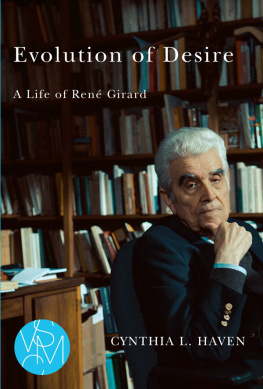
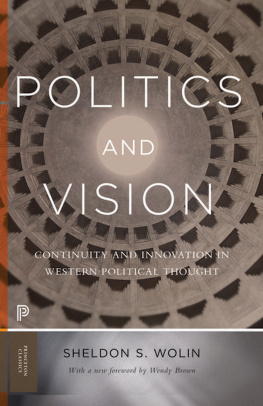
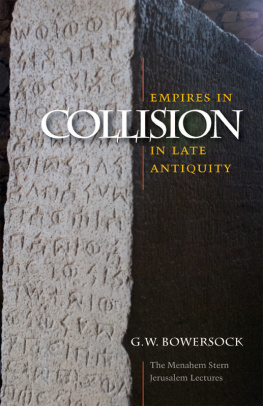
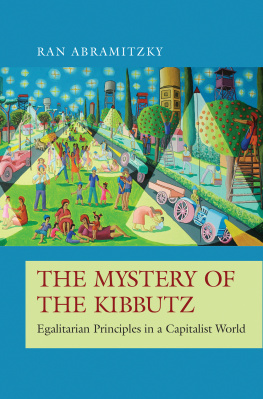
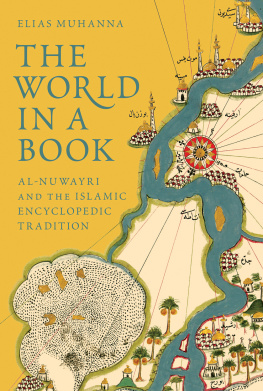
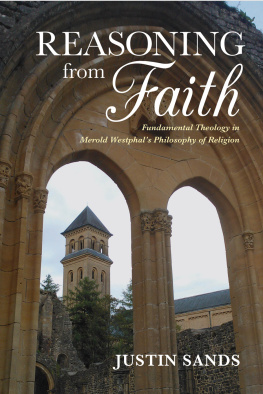
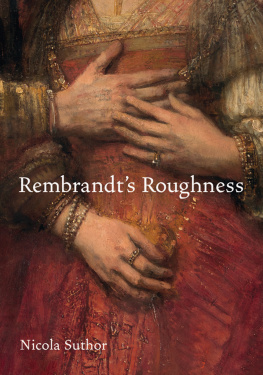

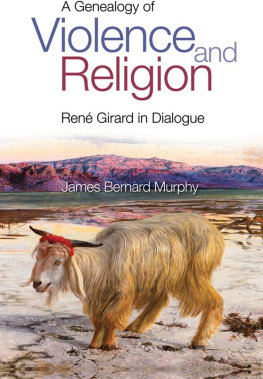
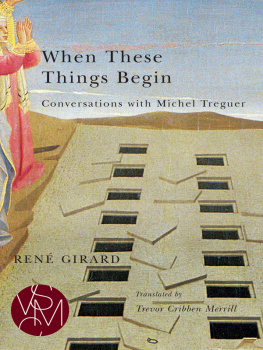


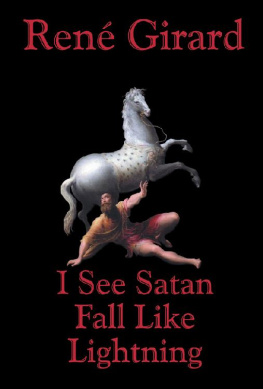
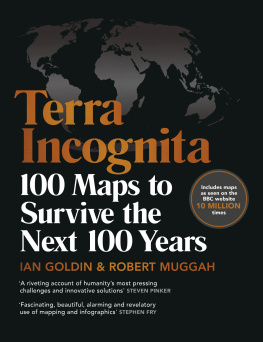
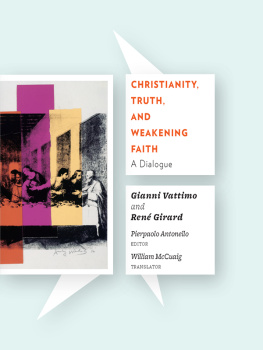
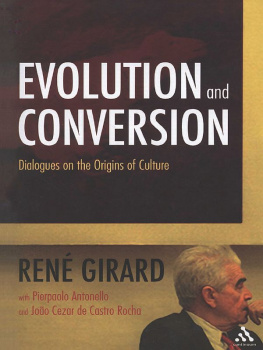

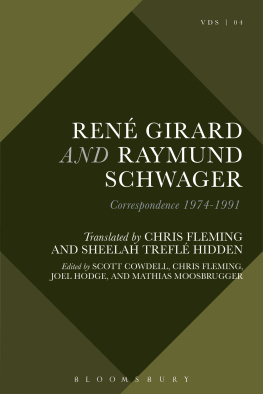
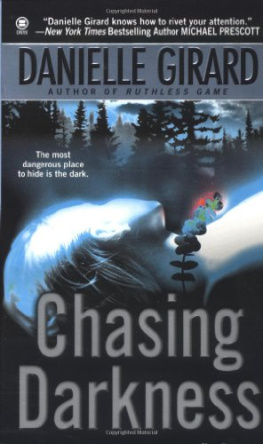

 The paper used in this publication meets the minimum requirements of ANSI/NISO Z39.48-1992 (R 1997) (Permanence of Paper).
The paper used in this publication meets the minimum requirements of ANSI/NISO Z39.48-1992 (R 1997) (Permanence of Paper).

